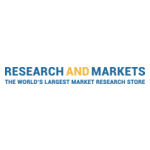DUBLIN–(BUSINESS WIRE)–The “Global Toxicity Testing Outsourcing Market Size, Share & Industry Trends Analysis Report by End-use, Method, GLP, Regional Outlook and Forecast, 2022-2028” report has been added to ResearchAndMarkets.com’s offering.
The Global Toxicity Testing Outsourcing Market size is expected to reach $4.9 billion by 2028, rising at a market growth of 8.4% CAGR during the forecast period.
Preclinical testing for a chemical destined for human exposure frequently includes toxicology testing. To establish safe exposure dosages in model organisms, various stages of in silico, in vitro, and in vivo research are carried out. The next stage of research entails first-in-man studies for human toxicological testing, if necessary.
The pharmaceutical business, biotechnology firms, contract research groups, or environmental scientists may all carry out toxicology testing. Testing for toxicity looks at the chemical components of completed items such as pesticides, drugs, cosmetics, food additives like packing materials, artificial sweeteners, and air fresheners. A variety of techniques are used to evaluate the compounds, including cutaneous application, respiration, oral intake, injection, and aquatic environments.
They can be rubbed on the skin or eyes, injected intramuscularly, intravenously, or subcutaneously or inhaled by covering the animals with a mask or putting them in a respiration chamber. They can also be given orally by mixing them into the animals’ food or inserting a tube into their stomachs. Testing for toxicity can also be done on substances that need to be discarded, like silt that needs to be dumped in a marine environment.
COVID-19 Impact Analysis
Companies have, however, adopted a number of techniques, such as varying shifts, downsizing staff, and working remotely, to lessen or eliminate these issues. Numerous businesses provided innovative testing and solutions to aid the government’s attempts to halt the COVID-19 outbreak.
These companies were able to lessen the impact COVID-19 has on their daily operations. The reduced working of these laboratories necessitated the need for outsourcing testing and research. Therefore, COVID-19 propelled the trend of outsourcing and as such had a positive impact on the toxicity testing outsourcing market.
Market Growth Factors
Acceptance Of Outsourcing Toxicity Tests Among Animal Care Societies
For the sale and importation of some consumer goods, genetically modified eatables, medical devices, vaccines, pharmaceuticals, and industrial chemicals, and pesticides, government rules in a number of nations demand genotoxicity testing on animals. Millions of animals are used every year for drug discovery, including monkeys, birds, hamsters, guinea pigs, frogs, cats, and mice. As a result, numerous animal ethical independent committees have been established in numerous countries all over the world.
Increased Efficiency In Drug Discovery And Personalized Therapy
Strategies to establish or predict safety and effectiveness in humans prior to drugs entering clinical trials could significantly lower the failure rate of novel therapeutics. More focus has been placed on in vitro drug discovery and personalized treatments. Additionally, there is a growing demand for humanistic animal models, which will most likely open up a variety of opportunities for rivals in gene toxicology research in the near future. Predetermining the toxicity of intended drugs could help in mitigating the negative effects.
Market Restraining Factors
Scarcity Of Skilled Professionals And Reluctance Of Regulatory Bodies
In vitro toxicity assessment methodologies are being used more often across a range of sectors. Regulatory agencies may substitute validated alternative testing for in vivo tests. Several nations have expressed a reluctance to adopt in vitro testing instead of in vivo procedures, even though the assay has proven its greater scientific relevance. In the United States, a number of regulatory agencies continue to use data derived from animal testing. Many organizations use in vivo approaches to evaluate novel toxicological test methods.
Scope of the Study
Market Segments Covered in the Report:
By End Use
- Pharmaceutical & Biopharmaceutical Companies
- Academic & Research Institutes
- Others
By Method
- In Vitro
- In Vivo
By GLP
- GLP
- Non-GLP
By Geography
- North America
- US
- Canada
- Mexico
- Rest of North America
- Europe
- Germany
- UK
- France
- Russia
- Spain
- Italy
- Rest of Europe
- Asia Pacific
- China
- Japan
- India
- South Korea
- Singapore
- Malaysia
- Rest of Asia Pacific
- LAMEA
- Brazil
- Argentina
- UAE
- Saudi Arabia
- South Africa
- Nigeria
- Rest of LAMEA
Key Market Players
List of Companies Profiled in the Report:
- Thermo Fisher Scientific, Inc.
- Eurofins Scientific Group
- WuXi AppTec Co., Ltd.
- SGS S.A.
- Intertek Group PLC
- Catalent, Inc.
- Laboratory Corporation of America Holdings
- Charles River Laboratories International, Inc.
- ICON PLC
- Medpace Holdings, Inc.
For more information about this report visit https://www.researchandmarkets.com/r/s5qp1q
Contacts
ResearchAndMarkets.com
Laura Wood, Senior Press Manager
[email protected]
For E.S.T. Office Hours Call 1-917-300-0470
For U.S./ CAN Toll Free Call 1-800-526-8630
For GMT Office Hours Call +353-1-416-8900







